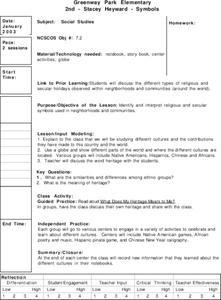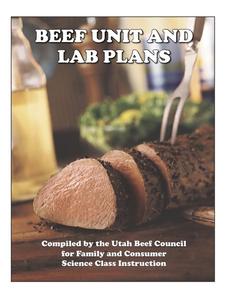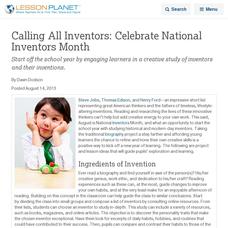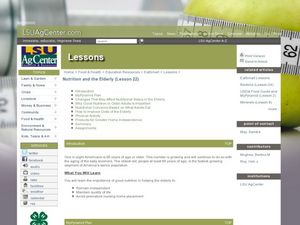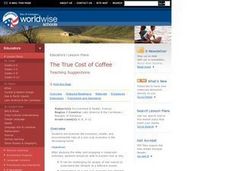Curated OER
Holidays Around The World
Second graders investigate the different holidays that are celebrated in cultures around the world. They identify the different symbols used in celebration and differentiate the interpretation. Students demonstrate in writing how the...
Curated OER
Goobers. Goobers? Goobers!
Students begin the lesson by noting the many ways in which to use peanuts. In groups, they use the internet to research the work of George Washington Carver. They discover the allergies and nutritional information of the peanut and...
Curated OER
Traditions and Languages of Three Native Cultures: Tlingit, Lakota, & Cherokee
Students understand the meaning of a tradition and know how it is maintained. They have a general knowledge of the environment, history and culture of the Tlingit, Lakota, and Cherokee
Utah Beef Council
Beef Unit and Lab Plan
What are the proper methods for cooking various cuts of beef? What are some basic rules regarding meat food safety? Here you'll find 10 lab plans with a variety of beef cookery activities, perfect for a home economics or cooking course.
Curated OER
On The Road Again: Cars, Culture, and Change Along Historic U.S. Highway 67
Middle and high schoolers look at historical photos and analyze some of the changes brought about by the automobile revolution in Arkansas during the 1920's. The book, A Journey Through Arkansas: Historic U.S. Highway 67, is used for...
Curated OER
Fast Fats: A Nutritional Analysis of America's Obsession with Fast Foods
How do you read a nutritional label? Help high schoolers practice reading nutritional labels on foods so they can calculate the calories in different types of foods. They will also examine the effects of fat on the body and the link to...
Curated OER
Calling All Inventors: Celebrate National Inventors Month
Start off the school year by engaging learners in a creative study of inventors and their inventions.
Redefining Progress
Have and Have-Not
Is there a correlation between a country's wealth and the extent of its ecological footprint? What exactly constitutes an ecological footprint, and how does one country stack up against the rest? This is a unique instructional activity...
Curated OER
Nutrition and the Elderly
Study the nutrition of elderly people and how it helps them to remain independent and healthy. Learners investigative the nutrition concerns of the elderly. MyPlate, vitamine requirements and sensory changes in the elderly are...
Curated OER
The Mystery of Machu Picchu
Make the exploration of Machu Picchu a real adventure with these innovative lessons.
Alabama Department of Archives and History
Alabama Tenant Farmers and Sharecroppers, 1865 to Present
The tenant farming and sharecropping systems that developed in the South after the Civil War, the reasons for their development, and the eventual decline of these systems are the focus of this two-day plan.
Curated OER
The True Cost of Coffee
Young scholars examine the economic, health and environmental risks of being a one-crop country. They explain the risks of relying on one crop. They also identify the factors that resist change.
Curated OER
The New England Fishing Industry:Sea Changes in a Community
Explore New England's economic and cultural past and possible issues New Englanders will face in the future. Middle and high schoolers research the fishing industry and the need for regulation. They analyze the topography of New England...
Curated OER
Get Acquainted with the Great Outdoors
National Parks and Recreation Month offers opportunities to improve health and education.
Curated OER
Hiroshima and Nagasaki: Still Teaching Lessons To This Generation
Discuss Laurence Yep's novella, Hiroshima, to inspire future historical fiction writers.
Federal Reserve Bank
Wait, Is Saving Good or Bad? The Paradox of Thrift
Could saving really harm the economy? Discover the paradox of thrift and how decreases in consumption can affect economic recovery and various markets and industries.
American Chemical Society
Man and Materials Through History
From the start of the Industrial Revolution, it only took 147 years for someone to invent plastic. This may seem like a long time, but in the history of inventing or discovering new materials, this is incredibly fast. An informative and...
Global Oneness Project
Deconstructing Consumerism
To increase awareness and launch a discussion of consumerism, class members view What Would It Look Like, a 25 minute film of images that capture the global effects of the consumption of goods. Viewers make a list of the images that they...
Global Oneness Project
Deconstructing Consumerism
A short, engaging video provides a critique of the hyper-consumerist mentality that many think have taken over the Western world. After watching the video, pupils reflect on their own habits and use evidence to respond to discussion and...
Beverly Hills High School
French Revolution
What led up to the French Revolution? Middle and high schoolers explore the factors that contributed to the storming of the Bastille on July 14th, 1789, as well as the events following that fateful day, with a presentation on the French...
Curated OER
Debating for Land
Students research pertinent information based on historical facts and is supported by quotations from primary sources in order to prepare for a class debate about land ownership in the 19th century.
Curated OER
Inventions and Inventors
Fifth graders investigate an introduction to both Invention Convention and Unit 3 in the Social Studies Book, the teacher will point out that many changes occurred in the United States during the late 1800s and early 1900s.¿¿¿...
Curated OER
Indians of the Pacific Northwest
Students organize acquired information and make inferences as to the kind of habitat and its probable location. They identify and replicate art forms characteristic of the Pacific Northwest coast involving the use of ovoids and "u forms".
Curated OER
Consumer Borrowing and Spending
Credit can be confusing for teens, some of whom are already using credit cards. Clear up misconceptions with this group research activity which has a solid outline with a lot of room to adjust to your needs and resources. Groups are...


